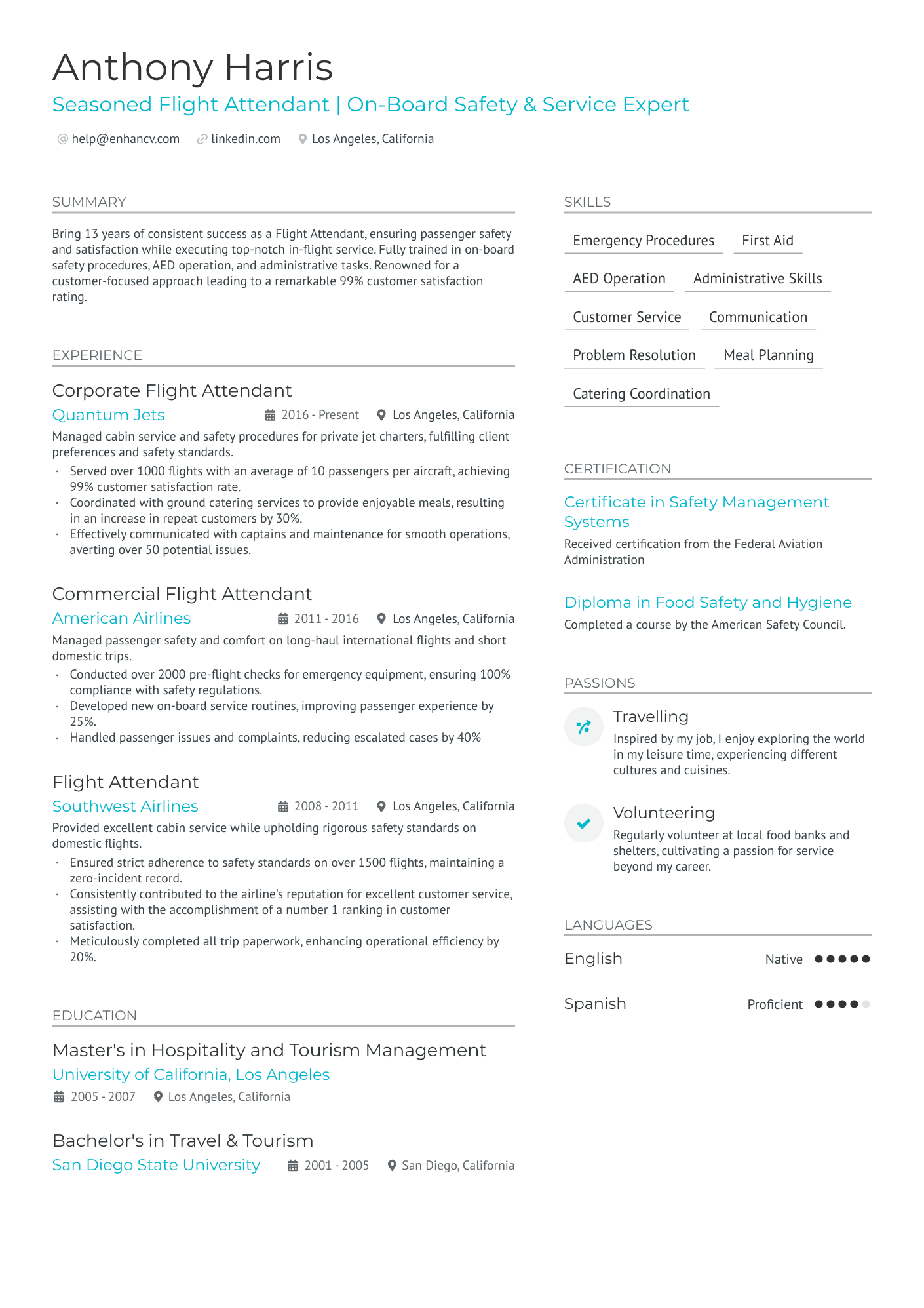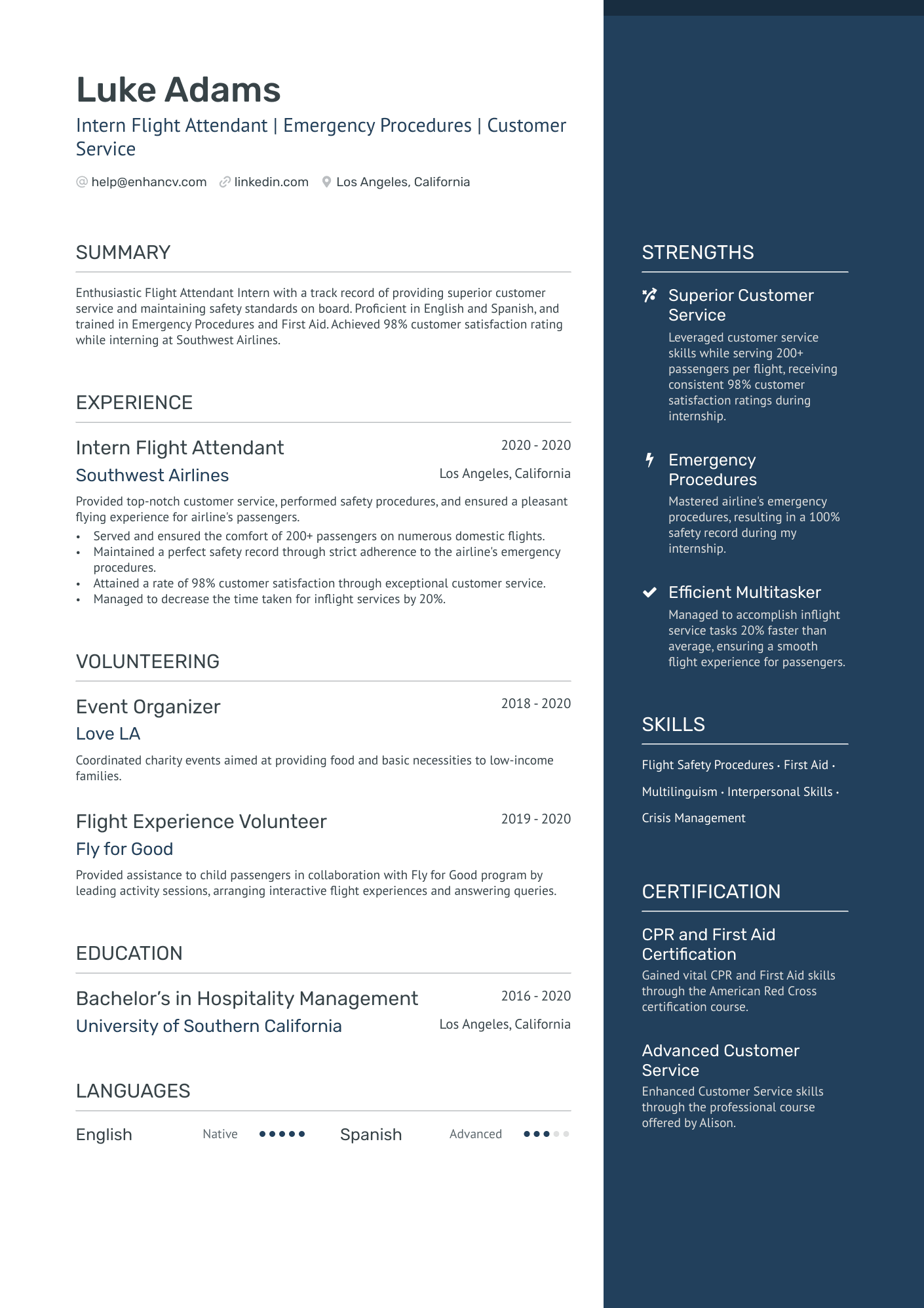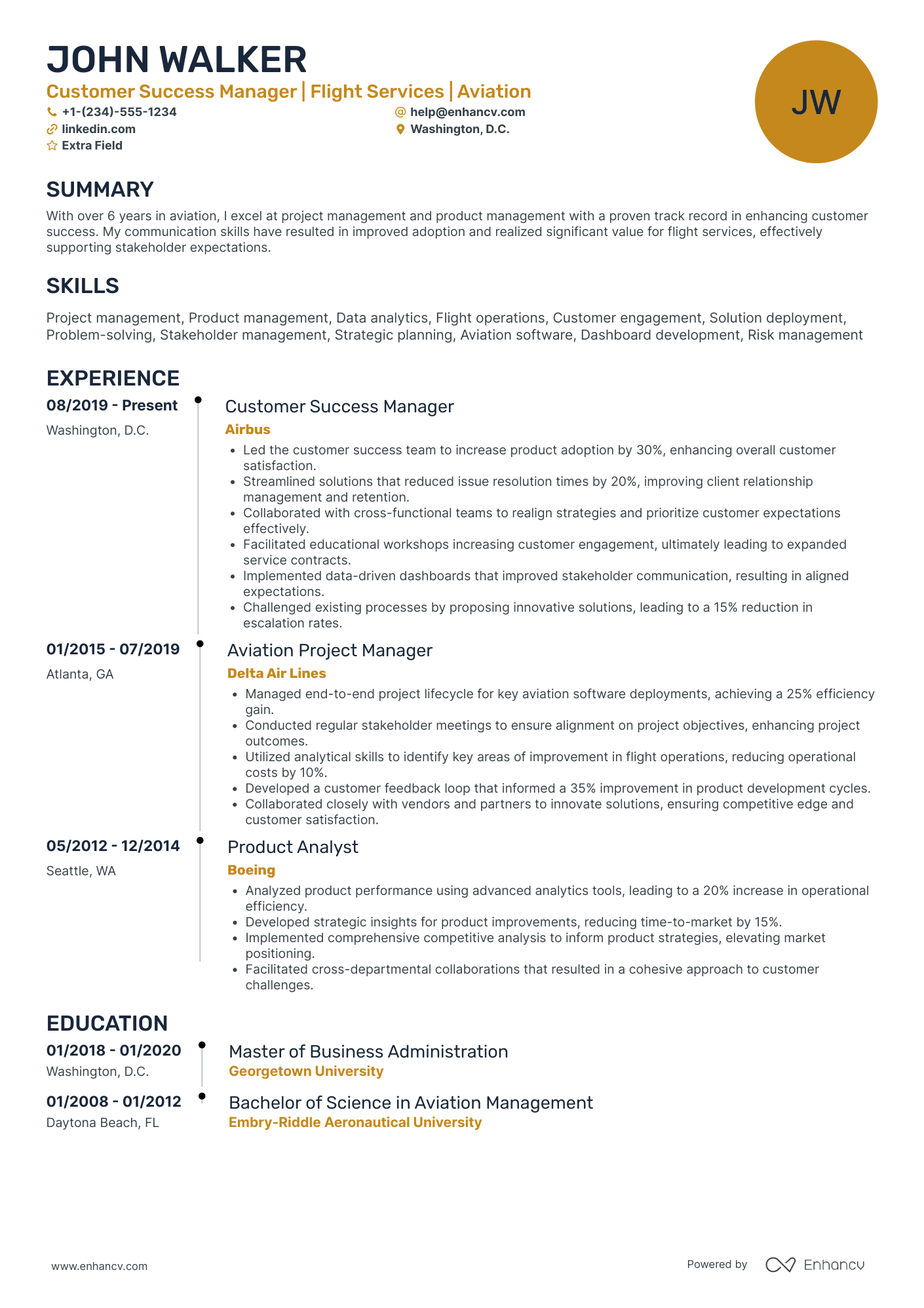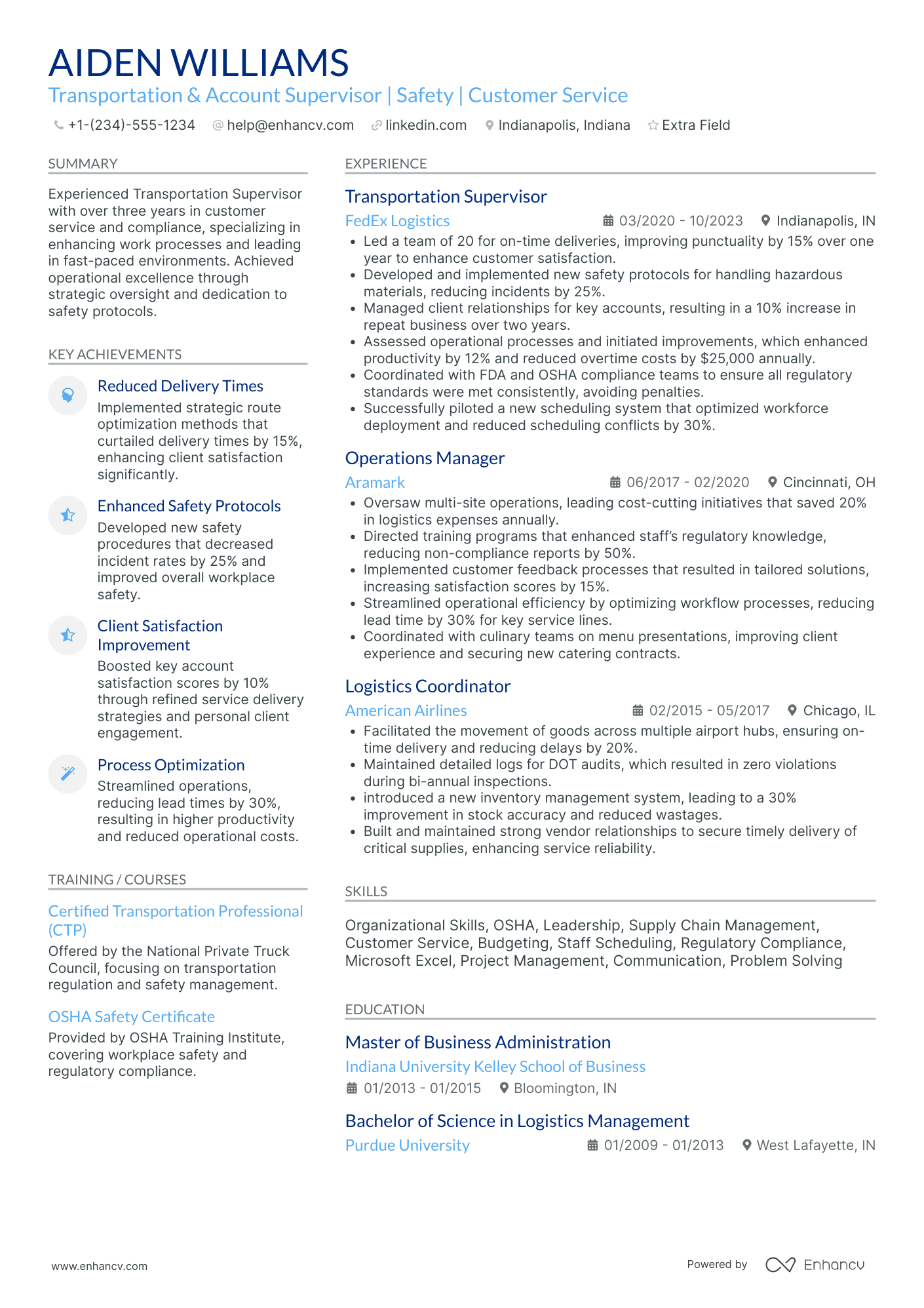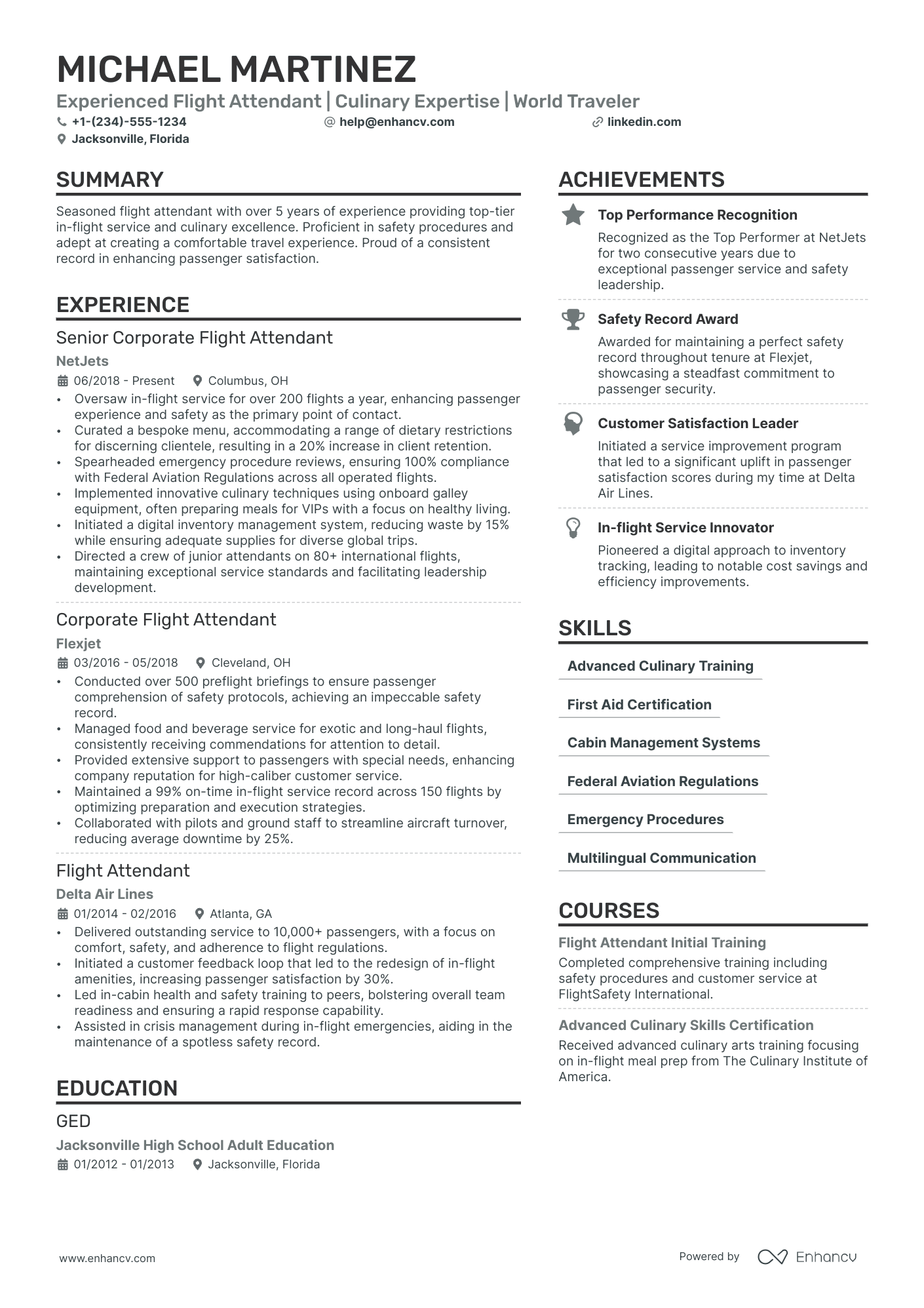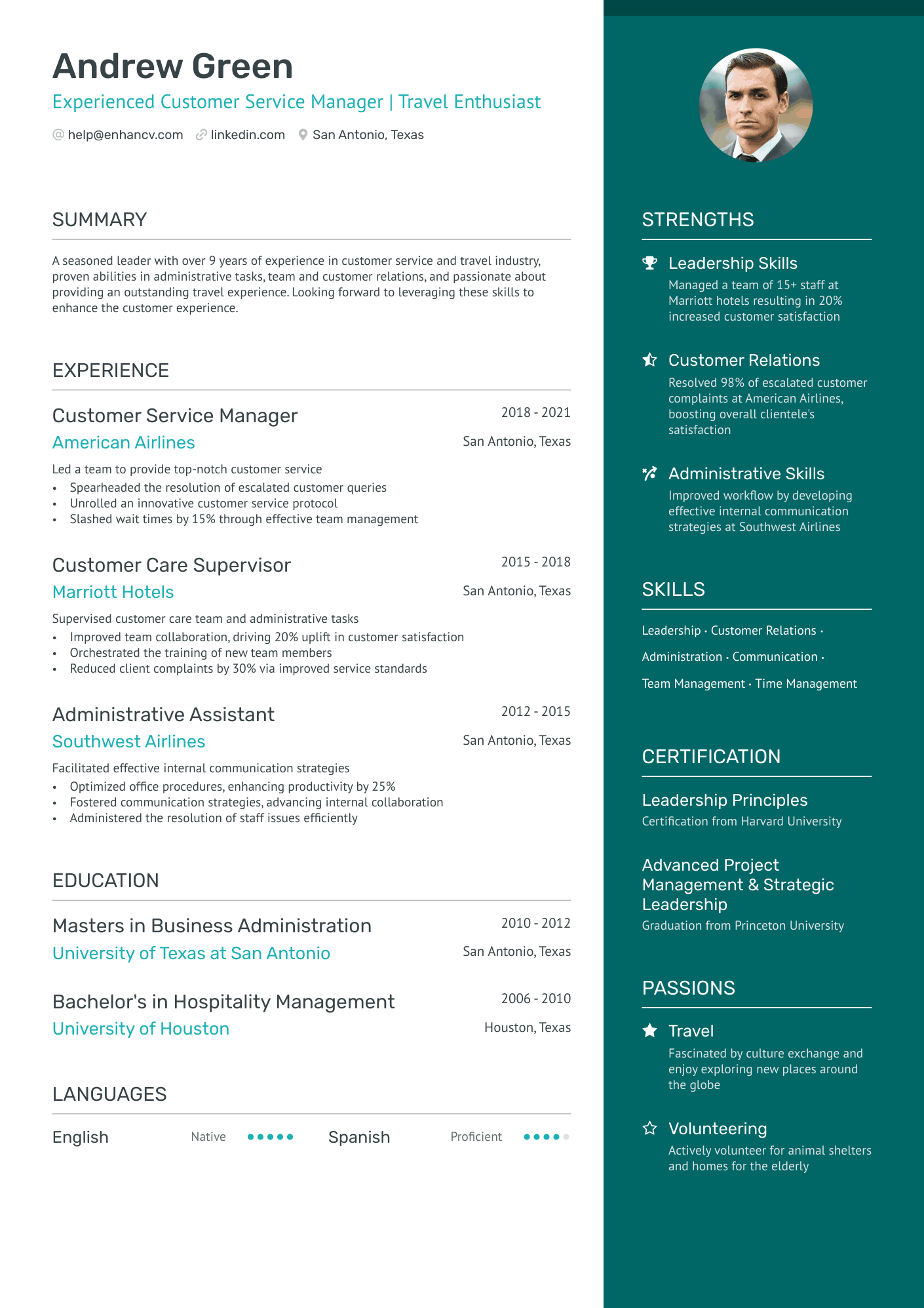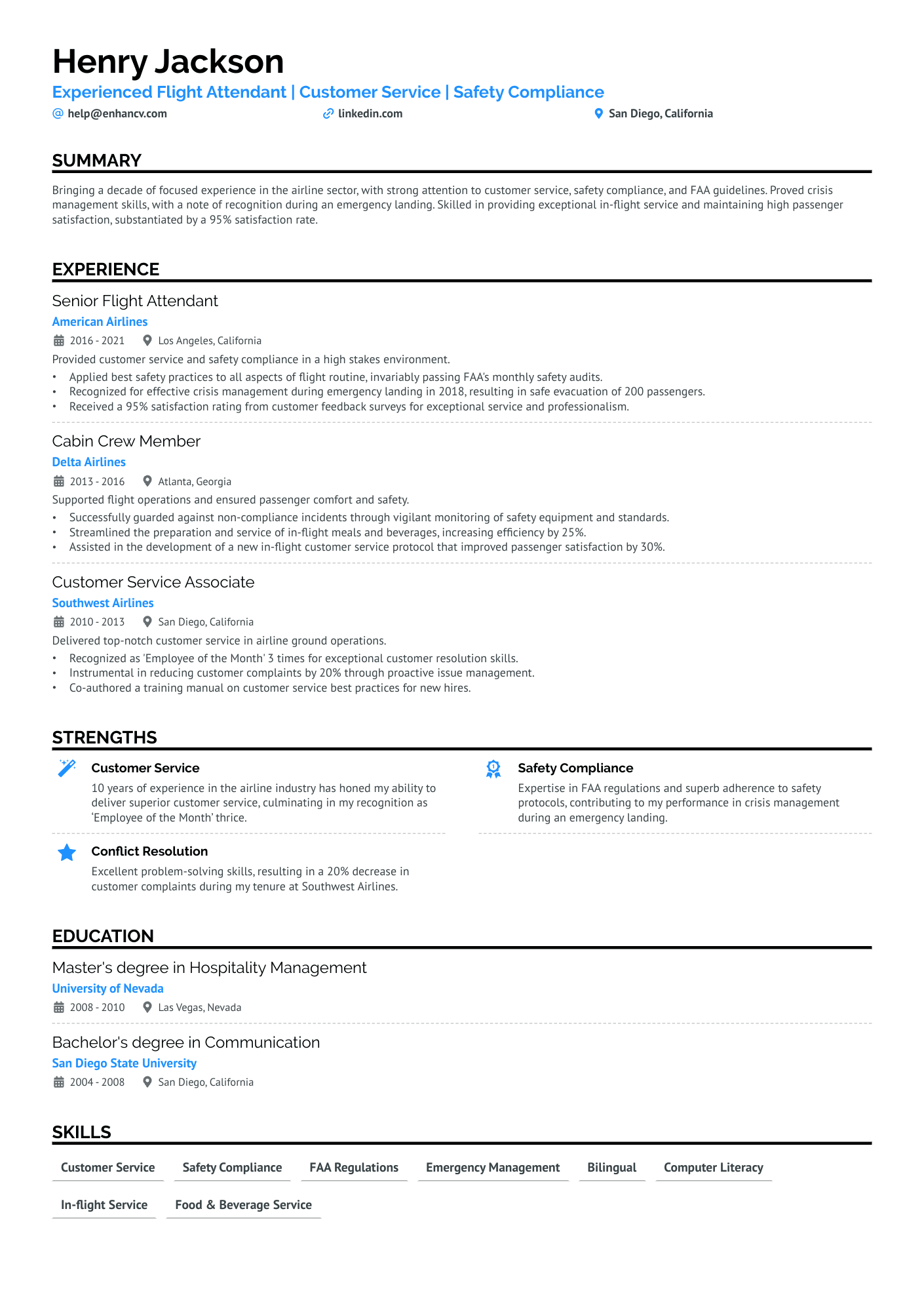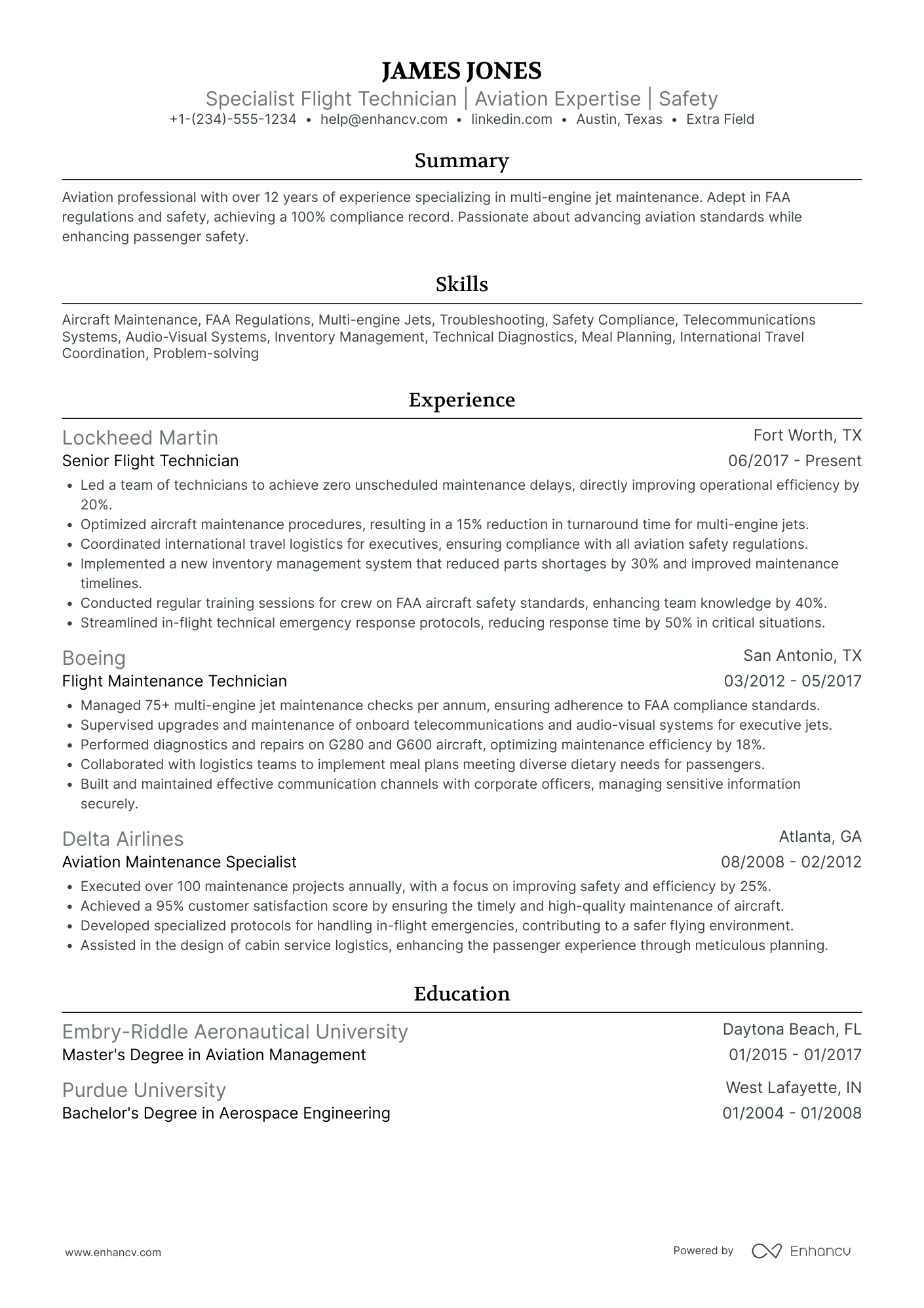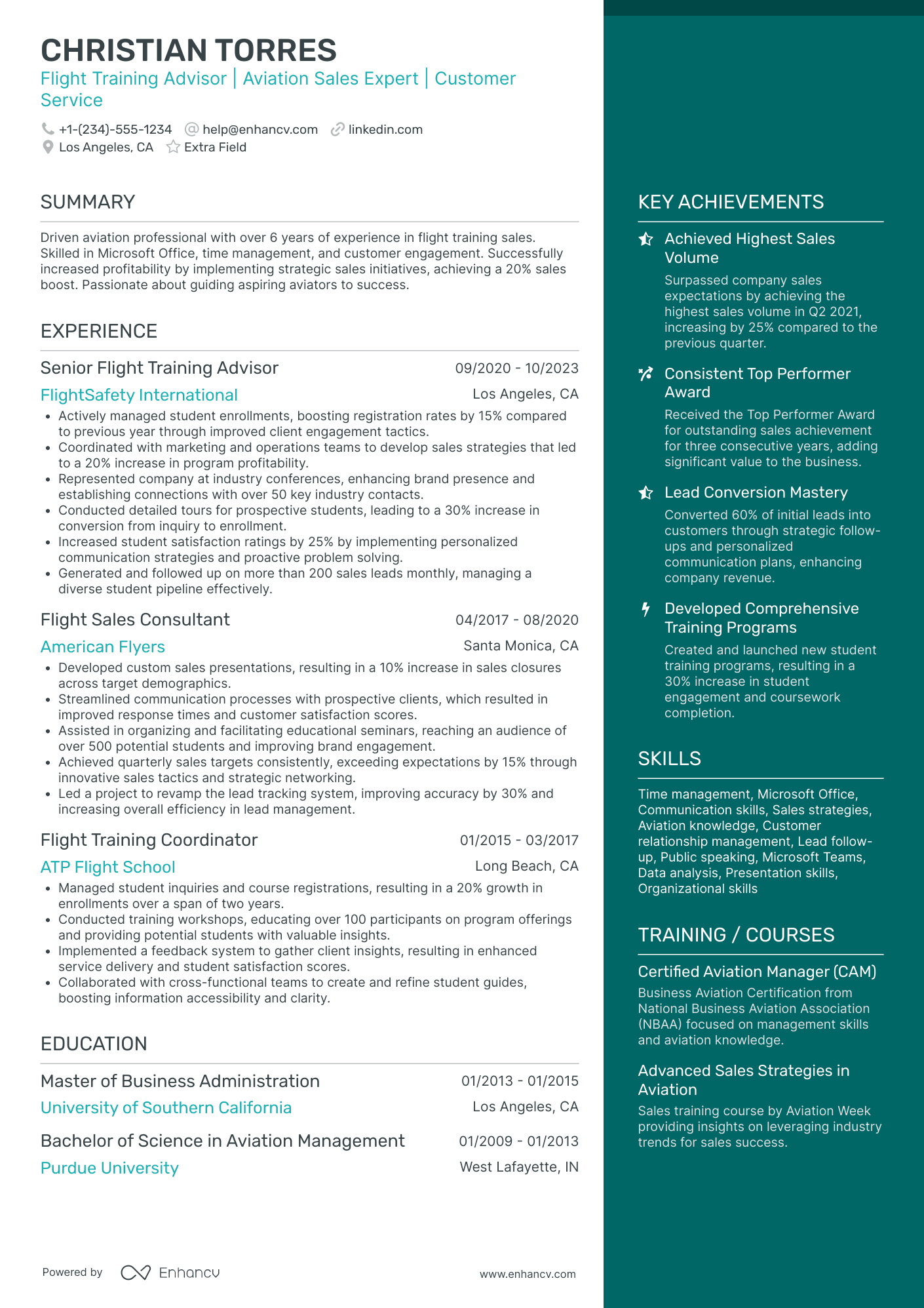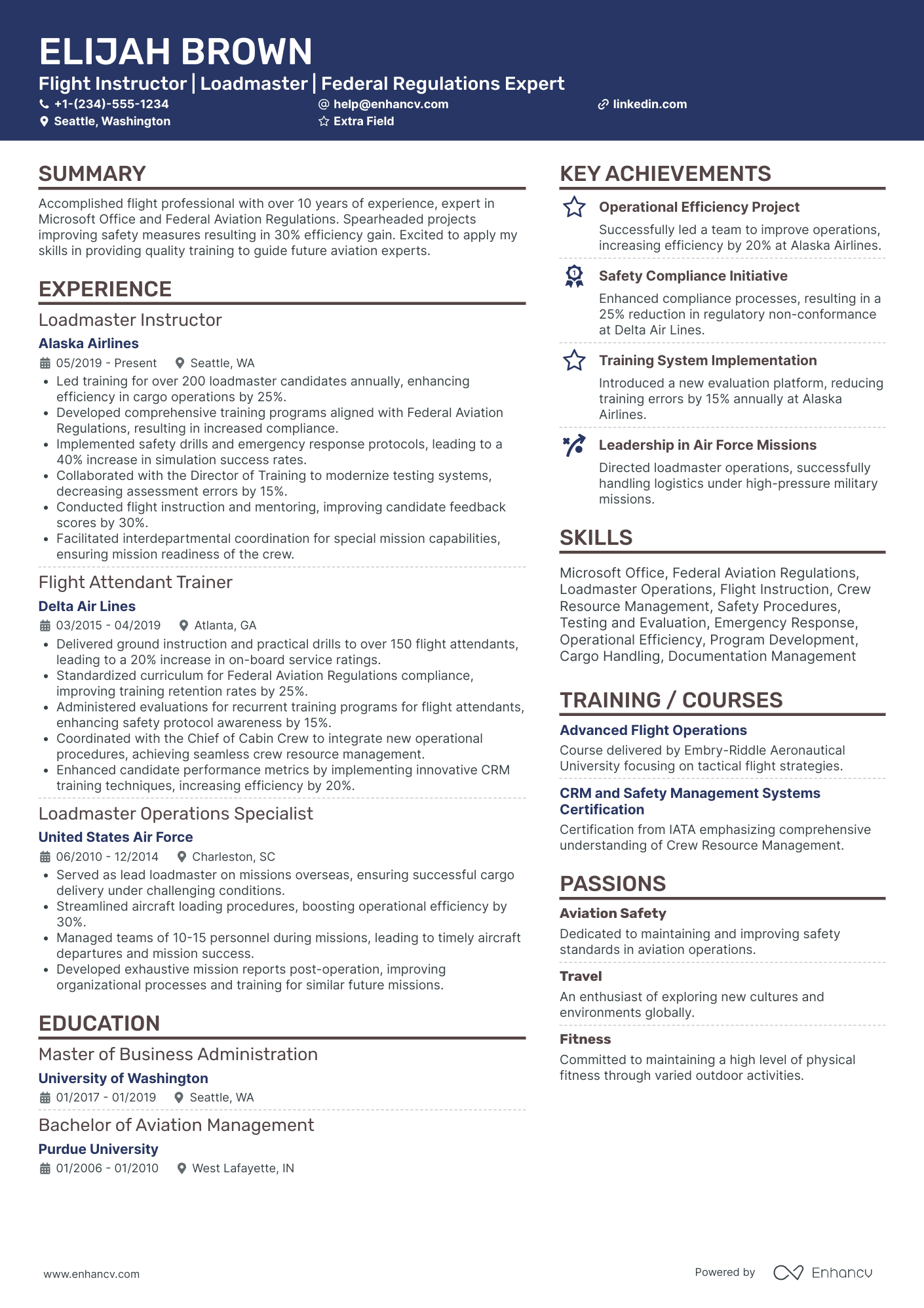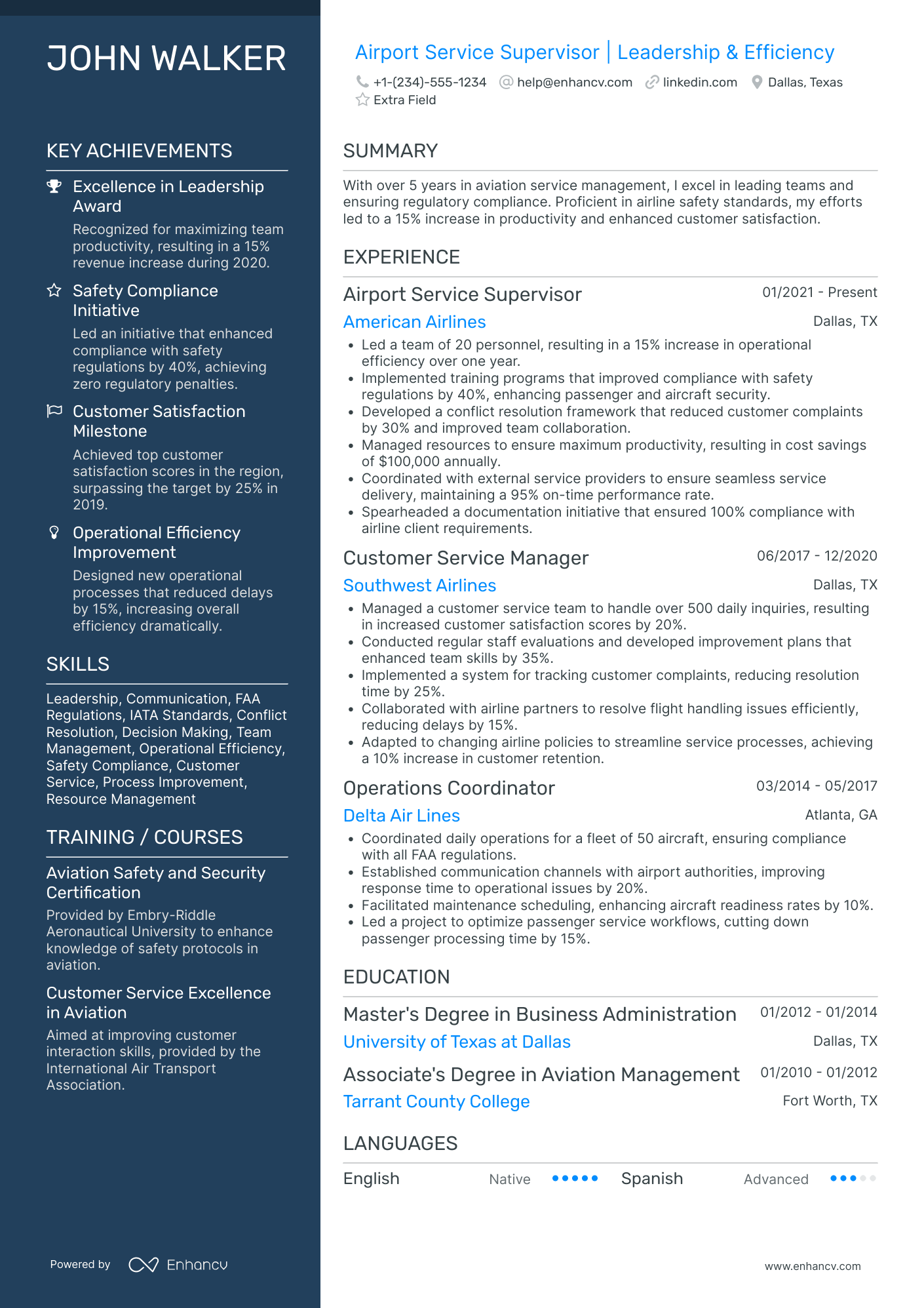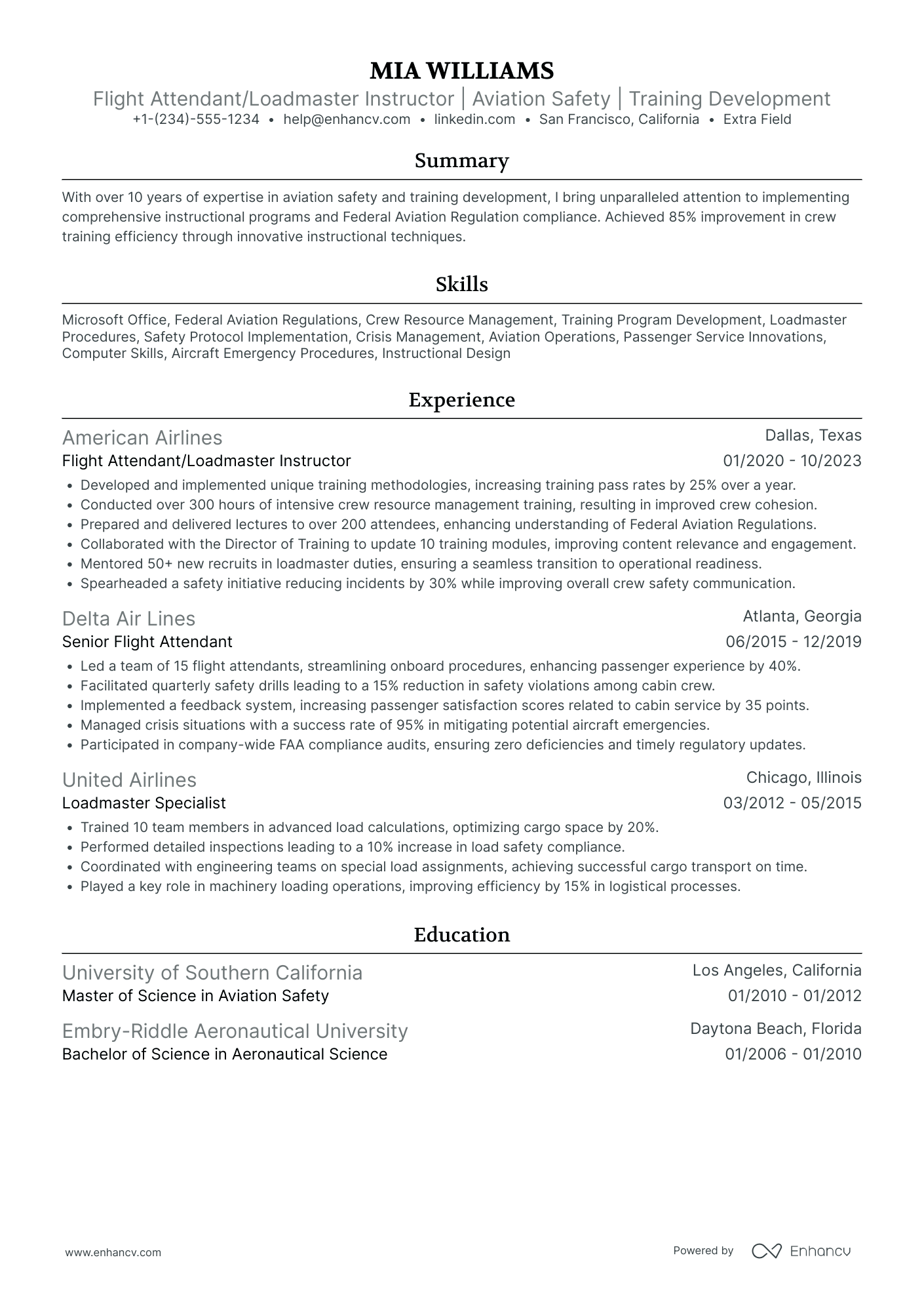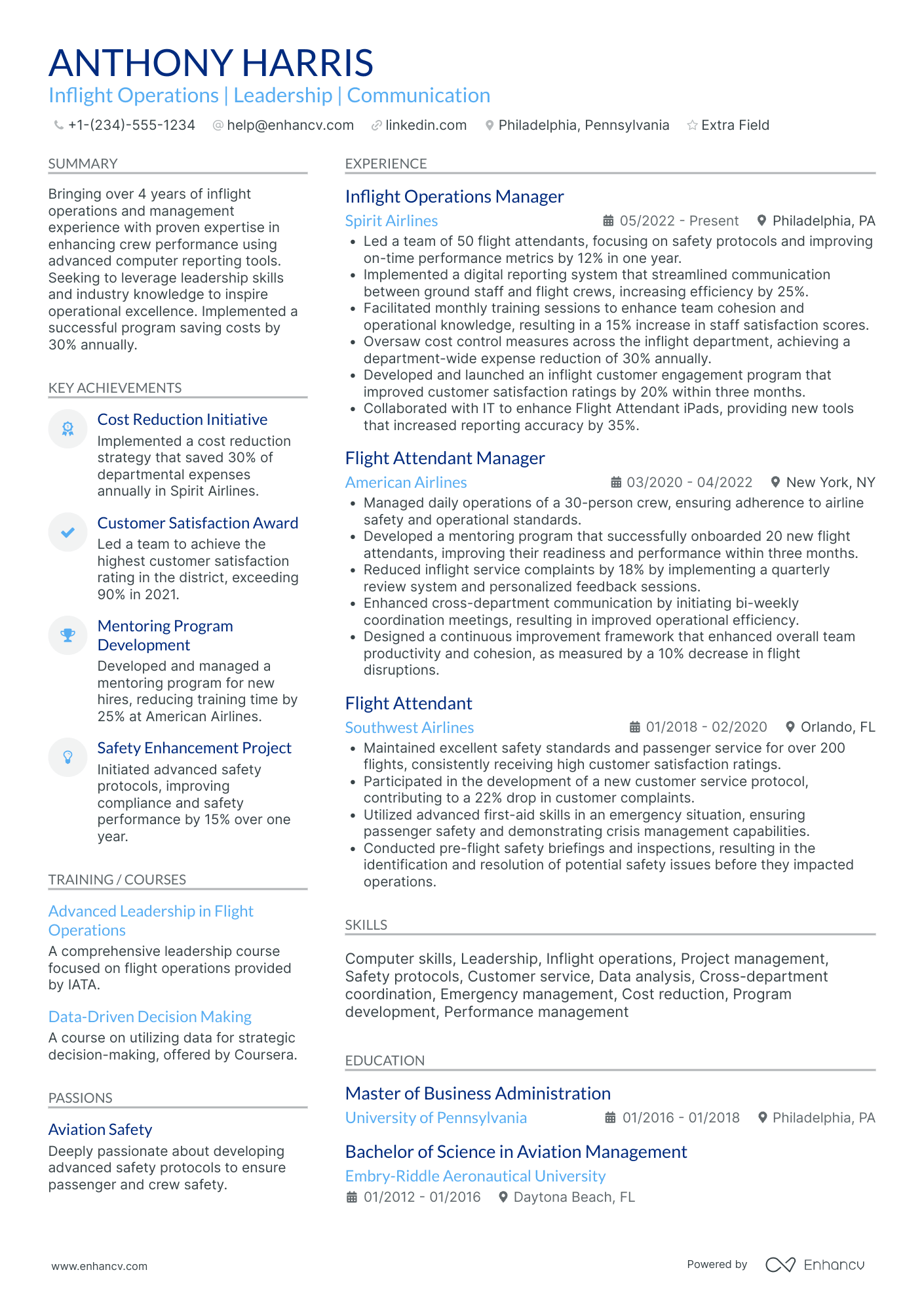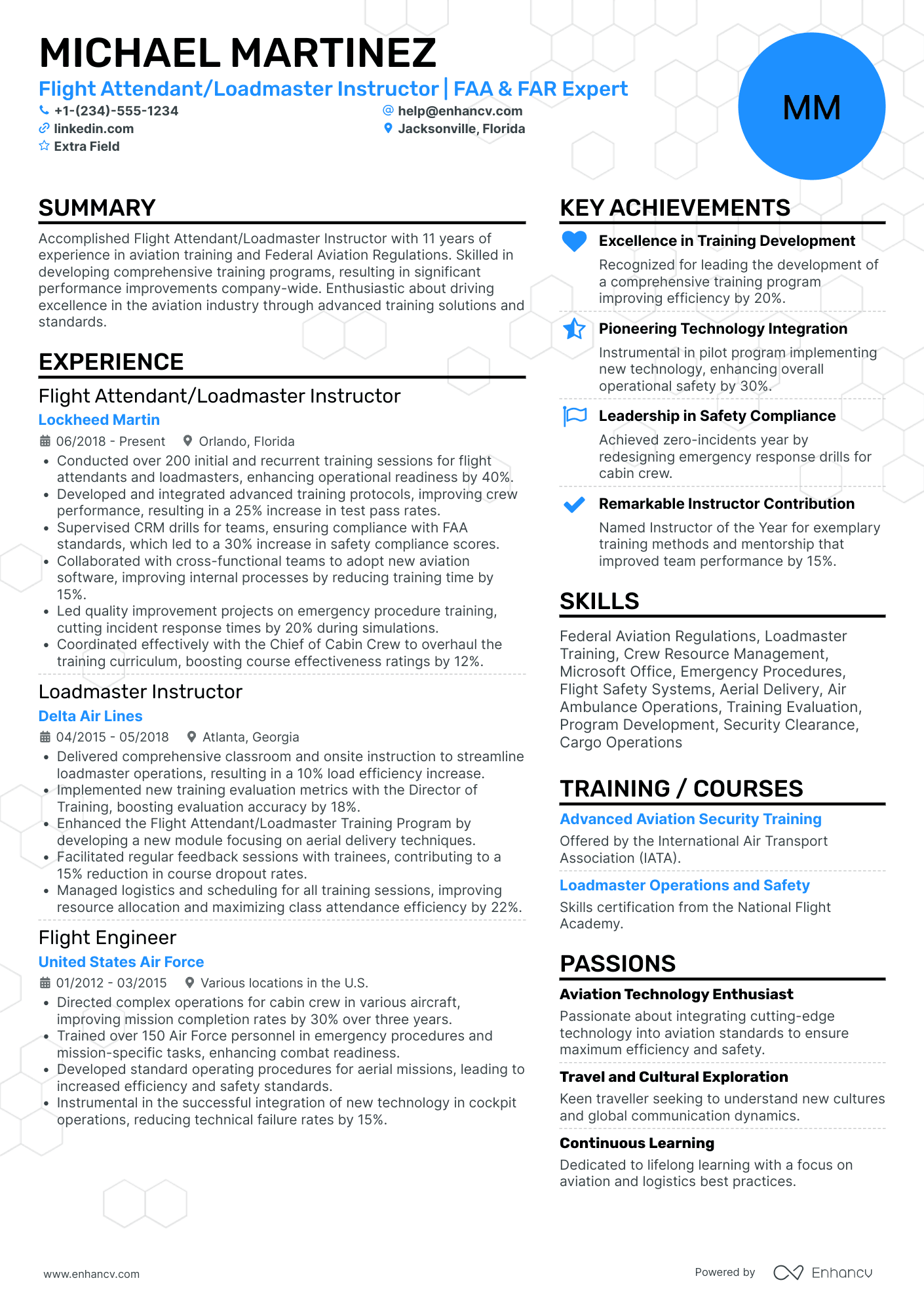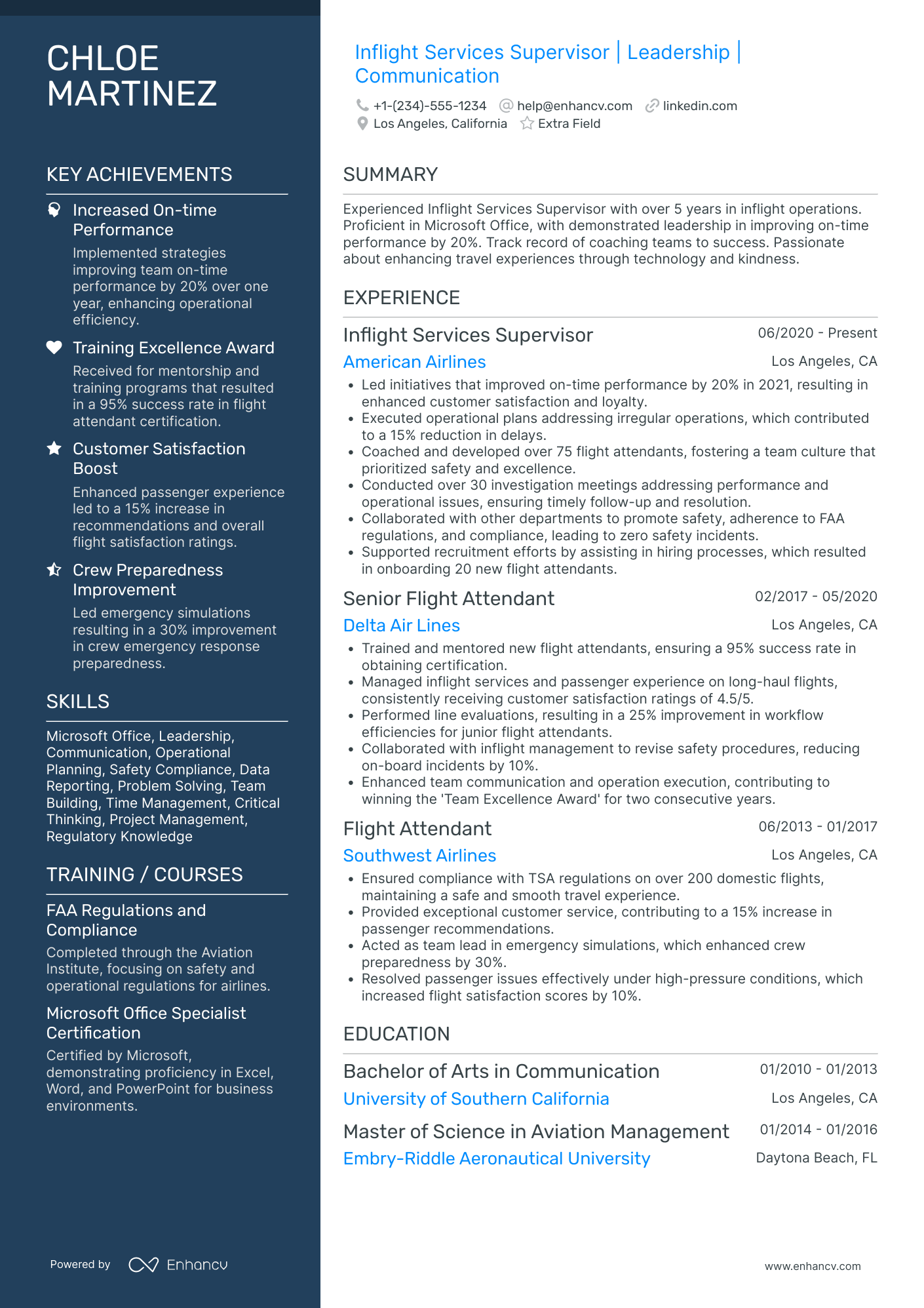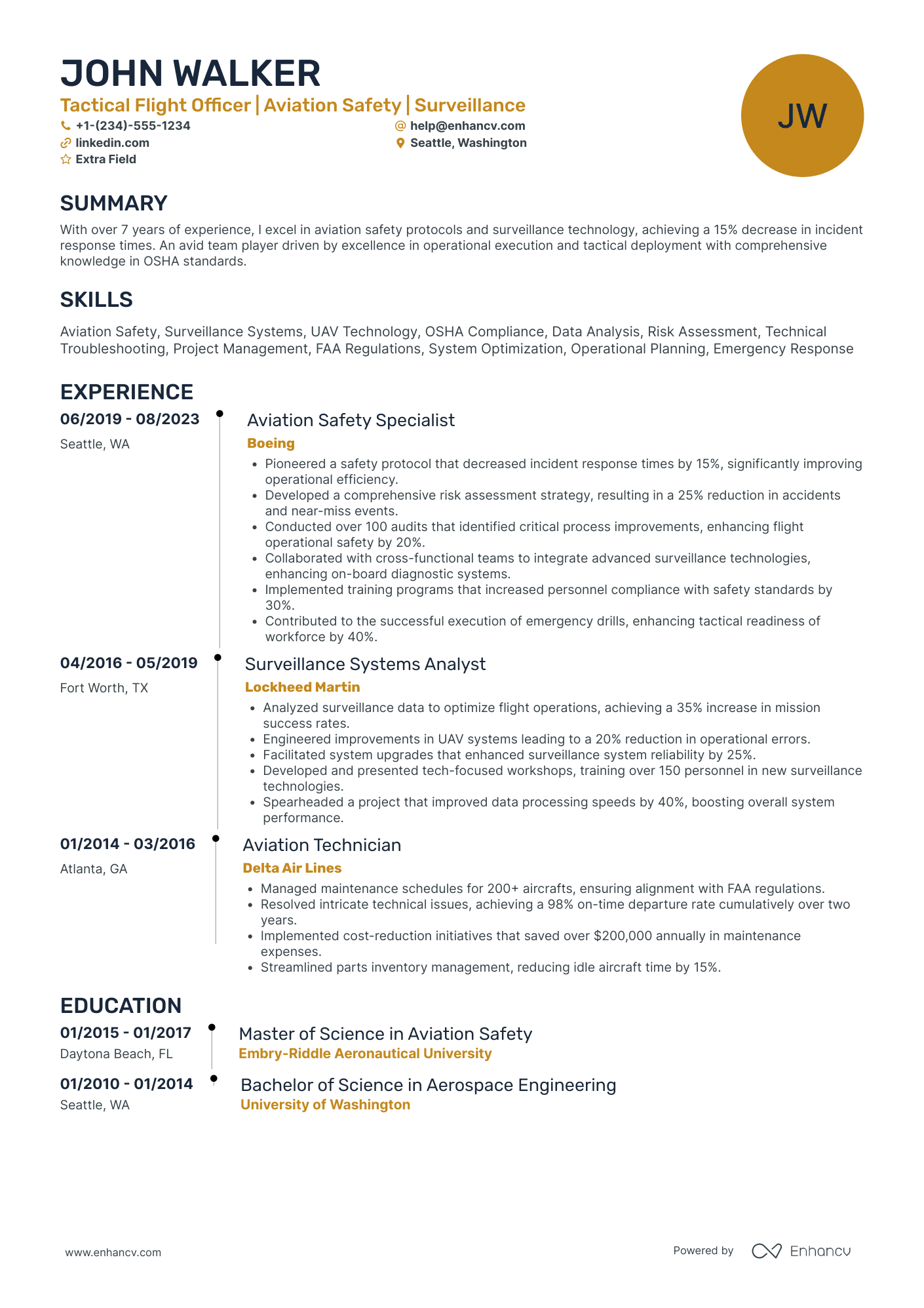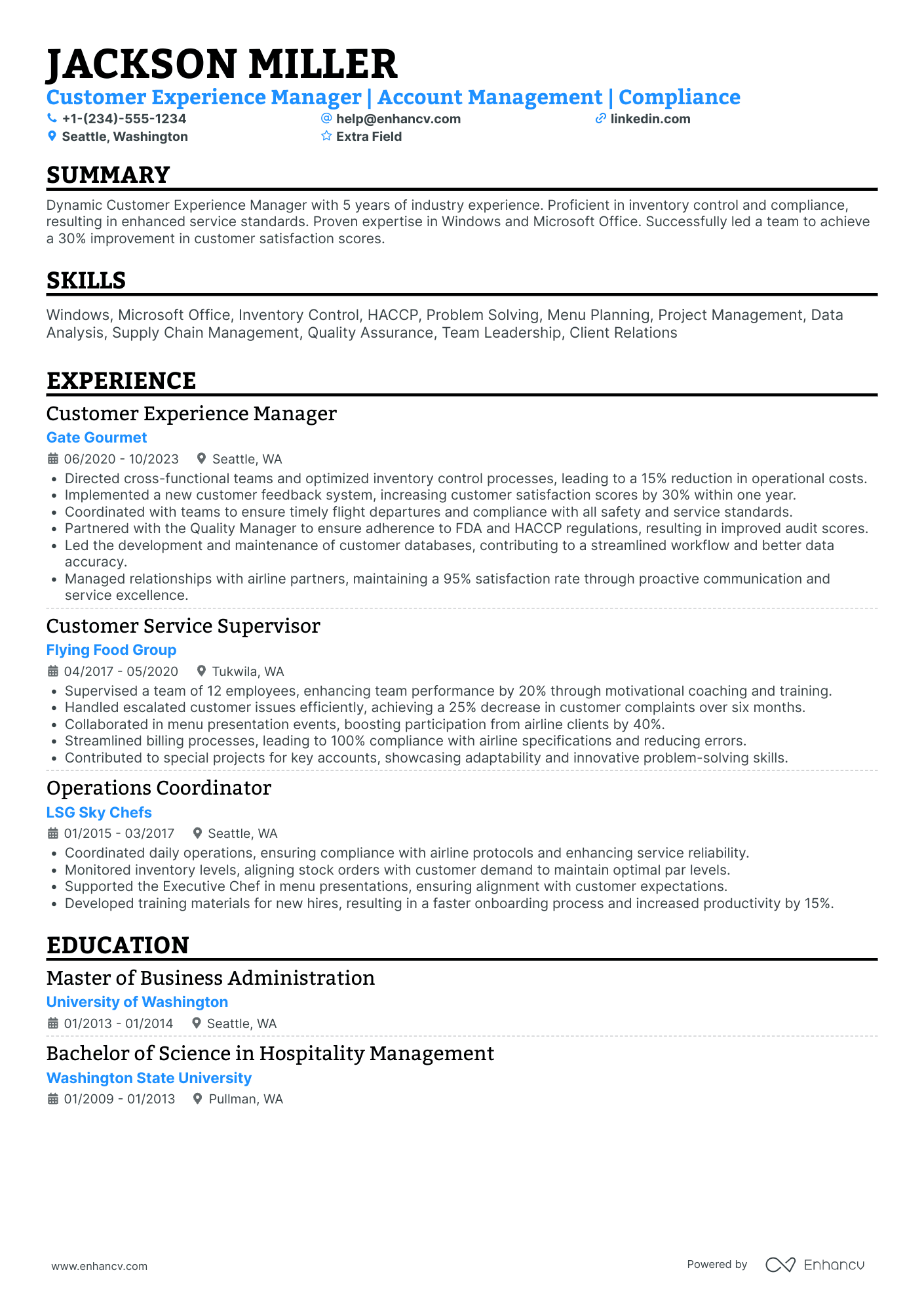The flight attendant profession is taking off, with an expected growth of 11% between 2022 and 2032, according to the U.S. Bureau of Labor Statistics. This promising trend suggests around 12,600 new opportunities will be available in the field by 2032. It marks an exciting time for anyone aspiring to take to the skies. But before you embark on this journey, it's crucial to do your due diligence. Start by researching potential аirline companies, comparing airline salaries, and understanding contract terms.
Furthermore, exploring flight attendant vlogs can offer a window into the day-to-day life and challenges of the role. If you've done your homework already and are now ready to make a great resume for your dream job, stay with us. We'll help you with tips on creating a flight attendant resume that opens doors.
Here's what this guide will teach you:
- Which sections should be included in your flight attendant resume?
- What you should put in your flight attendant summary?
- How you can write about your work experience in a way that interests recruiters, even if you've never worked in aviation?
- Which skills are crucial to feature on your resume?
If you're open to something different related to air travel, we have other choices available too.
- Corporate flight attendant Resume
- Airport Manager Resume
- Aircraft Dispatcher Resume
- Pilot Resume
- Airline Pilot Resume
- Drone Pilot Resume
How to format a flight attendant resume
If you're an experienced flight attendant, the reverse-chronological resume format is highly recommended. It highlights your career progression and achievements across different airlines or flight attendant positions.
New flight attendant hopefuls might find great value in choosing either a functional resume format or a hybrid layout. They both prioritize skills and strengths rather than putting the focus on past jobs.
On top of that, it's very important to choose a good resume design, especially if you want to stand out among other applicants. Our professional resume templates offer a modern and clean look that grabs attention quickly.
When getting your flight attendant resume ready, keep these tips in mind:
- Convert your resume to a PDF file in order to keep the layout and design the same, no matter how or where it's opened.
- Include your contact information and more precisely an email address, a phone number, and a current city or region.
- Use 1-inch margins all around your resume to keep it looking neat and easy to read.
- Choose Rubik, Volkhov, or Montserrat for your resume fonts. Their size should be between 10 and 12 points to make sure it's readable but also fits everything you need to include.
- When picking colors for the resume, think about what looks professional and is easy on the eyes. Blue, mirroring the sky's serenity, is a top choice because it symbolizes trust.
- Optimizing your resume for Applicant Tracking Systems is vital too. These systems scan resumes for relevant keywords in areas like skills, education, and work experience.
Customize your resume for the market – a Canadian format, for example, might vary in structure.
If your flight attendant resume could use a refreshing, think about using our free AI resume checker. It performs 16 important checks to get your resume ready and to improve your chances of getting interviews.
Is your resume good enough?
Drop your resume here or choose a file. PDF & DOCX only. Max 2MB file size.
Resume formatting matters, but now let's move on to the key sections that must be included in your CV.
The top sections on a flight attendant resume
- Contact information: It’s critical for communication with the recruiter.
- Professional summary: Highlight why you are suitable for the cabin crew.
- Work experience: Demonstrate your past experience in customer service or in aviation.
- Skills and certifications: Showcase your specific abilities like first aid, CPR, and foreign language fluency, necessary in the field of aviation.
- References: Include recommendations from former employers or educators to provide credibility to your application.
As you put together your flight attendant resume, keep in mind that recruiters will be searching for clear indicators that you're the perfect candidate for this position.
What recruiters want to see on your resume
- Proven customer service excellence that shows the ability to enhance passenger satisfaction and loyalty through exceptional service interactions.
- Proficiency in safety and emergency procedures that highlight a commitment to passenger safety and readiness to handle critical situations.
- Proof of multilingual skills that show the ability to overcome language barriers with international passengers.
- Evidence of flexibility and adaptability that shows the ability to manage unpredictable flight schedules.
- Demonstrated physical resilience, crucial for upholding service quality on long flights and efficiently dealing with luggage.
Impress recruiters by tailoring a clear and informative work experience section on your flight attendant resume. This section is key for employers assessing your suitability for their team.
How to write your flight attendant resume experience
The main aim of flight attendants is to make service for passengers better. This means making sure they’re more comfortable, ensuring their safety, and making them more satisfied with the service they receive. Talk about your own successes in previous jobs, giving examples of how you made service better and the good results that came from it.
- •Served food and drinks to passengers quickly.
- •Worked well with the cabin crew team.
- •Took care of passengers' needs during flights.
- •Handled payments for in-flight purchases.
The example isn't strong because:
- It's too general. The listed tasks could apply to many jobs.
- Missing flight attendant tasks.
- It's vague about any specific achievements.
Now let's improve it a bit.
- •Quickly served food and drinks to more than 200 passengers on each flight.
- •Helped keep all flights safe with a team of 6, with no accidents for 2 years.
- •Sold snacks and items worth $500 on each flight, increasing sales by 30% in just 9 months.
- •Adapted to sudden schedule changes, taking on 30+ unexpected flight duties for the last 12 months
The second example is better because it:
- Shows the flight attendant's direct impact, making their successes easy to grasp.
- Measures the specific outcomes of their efforts on passenger satisfaction.
- Points out adapting to unexpected changes, showing that they can handle surprises.
PRO TIP
Update your LinkedIn profile whenever you revise your resume. Consistency is key, as recruiters check both to ensure there are no discrepancies.
Tailoring your flight attendant resume involves deciding on its length. A one-page resume might be concise, but a two-page resume could provide a detailed view of your customer service and safety skills. Focus on what highlights your qualifications best.
In the next section, we'll cover how to put numbers in your resume that emphasize your work as a flight attendant.
How to quantify impact on your resume
On a flight attendant resume, emphasize your actions and their outcomes, even if they're not all quantifiable. Also, try starting achievements with action verbs to catch the recruiters' eyes.
- Showcase your communication skills by specifying the number of languages you speak.
- Highlight your customer service experience by indicating the number of years you've worked in such roles.
- Illustrate your ability to handle a high workload by detailing the number of flights you’ve managed weekly.
- Prove your capability to serve a large number of passengers by noting the typical count per flight.
- Reflect your readiness for medical emergencies by listing the exact number of First Aid/CPR certifications you've obtained.
- Show you can handle stress and adapt by listing how many tough layovers you've dealt well with, which also illustrates you're good with changes and challenges.
How do I write a flight attendant resume with no work experience
Embarking on a career as a flight attendant is an exciting path for both recent graduates and seasoned professionals seeking a change from conventional roles to a more dynamic, people-oriented environment. This field attracts individuals from various professions, including accountancy, nursing, teaching, and even law.
If you are newly graduated and eager to start your career as an FA, here's what can help you with to get noticed, despite the lack of experience.
- Objective section: Write 2-3 sentences that highlight your passion for customer service, any relevant interpersonal experiences, and your career goals. Recruiters should see how your ambitions match the airline's service standards.
- Skills: List both soft and hard skills crucial for a flight attendant, such as effective communication, emergency response training, multicultural sensitivity, etc. Whether from volunteer work, courses, or other jobs, showcase every skill applicable to the flight attendant role.
- Education and certifications: Mention your education level, any majors or focuses, and relevant training (such as CPR certification) that could be beneficial for a flight attendant.
- Work experience: Include any previous employment that showcases transferable skills like teamwork, problem-solving, customer interaction, etc.
How to list your hard skills and soft skills on your resume
When creating your resume for a flight attendant job, it's important to show both your hard and soft skills. Think about what you're good at and put together a list of skills that will really make an impression on recruiters.
Best hard skills for your flight attendant resume
- First aid administration
- CPR first aid
- Advanced swim training
- Meal and beverage service
- Emergency equipment operation
- PA system operation
- Multilingual skills
- Airline reservation system knowledge
- Proficiency in aircraft evacuation procedures
- Flight safety regulation knowledge
- Skill in operating emergency evacuation equipment
- Familiarity with automated external defibrillators (AED)
- Understanding of aviation security measures
- Knowledge of in-flight service procedures
When tailoring your skill section, closely read the job description and make sure your skills fit what they're looking for.
Best soft skills for your flight attendant resume
- Excellent customer service
- Active listening
- Diplomacy and tact
- Effective communication
- Multitasking
- Detailed oriented
- Stress management
- Teamwork
- Flexibility
- Strong people skills
- Patience
- Cultural awareness
- Adaptability
- Empathy
- Ability to stay calm under pressure
Now that we’ve talked about skills for good flight service, let's look at the educational part that helps with these skills. This section explores more about degrees and certificates.
How to list your certifications and education on your resume
The most common majors pursued by flight attendants in 2021 (counting all academic degrees) were Business (10,934 people), Communications (4,911 people), and Education (4,358 people).
To properly list your education on a flight attendant resume, use a format that highlights the most important details and makes it easy for hiring managers to understand them.
Follow this guide:
- Degree and major: Begin with the type of degree you received and your major or focus area. This is important because it shows your foundational knowledge and any specific focus relevant to customer service or safety.
- Institution name: Next, include the name of the institution where you obtained your degree. This information lends credibility to your resume, particularly if the institution is recognized for its programs related to hospitality, communication, or safety training.
- Location: Adding the location (city and state) of your institution can be useful, especially if the region is known for its strong emphasis on hospitality training.
- Graduation date: State when you graduated. If you're still in school, mention your expected graduation date.
- Grade Point Average: Including your GPA is optional and usually recommended only if you've graduated recently and it strengthens your application. If it was above a 3.5, including it can highlight your academic dedication otherwise you better skip it.
An example of how to format an education entry effectively:
- •Focused Studies: Customer service excellence, team management, and conflict resolution.
Besides getting a bachelor's degree, it's a good idea to also get a cabin crew certificate from a professional training center like The flight attendant Academy.
Recruiters look for candidates who are committed to their personal and professional growth, especially in a field as demanding as aviation. Showcasing certifications on your resume, like advanced safety training, service excellence courses, or first aid qualifications, demonstrates your effort to keep pace with the evolving demands of flight service. These following certifications can make your candidacy even more attractive to hiring managers.
Best certifications for your flight attendant resume
Crafting each part of your resume clearly is crucial, especially for flight attendants, where a compelling summary can capture the recruiter's interest.
How to write your flight attendant resume summary or objective
Experienced flight attendants benefit from including a summary on their resumes. This concise introduction emphasizes your most relevant skills and experiences, directly correlating them to what the job seeks. It gives recruiters a fast overview of how well you fit the flight attendant role. We'll look at a strong and a weak example of a flight attendant resume summary to point out effective strategies.
A broad statement like this won't catch the attention of hiring managers, nor does it highlight any specific skills.
This example is better because it:
- Highlights 9 years at Alaska Airlines and showcases a deep commitment and extensive experience in the aviation field.
- Emphasizes proficiency in English, French, and Spanish, which indicates the candidate's ability to communicate with diverse passengers.
- Puts the focus on delivering high-quality service and establishes the candidate as a valuable team member.
- Shows the applicant wants to get better at skills like teamwork and leadership, demonstrating that they’re looking forward to growing their career.
Optimize your resume summary and objective for ATS
Drop your resume here or choose a file.
PDF & DOCX only. Max 2MB file size.
Additional sections for a flight attendant resume
When tailoring your flight attendant resume don't forget to underline your successes. In addition to the usual summary, work history, education, and qualifications, think about adding these sections:
- Training: Shows ongoing learning and knowledge in aviation safety and service standards.
- Language skills: Indicates the ability to communicate with passengers from various backgrounds.
- Passions: Mention interests and hobbies related to travel or customer service (e.g., exploring new cultures, language learning, etc.) to show what motivates and inspires you in your role as a flight attendant.
- Strengths: Highlight your unique talents that are relevant to flight attendant duties.
- References: Include recommendations from past employers or instructors to attest to your qualifications and character.
Key takeaways
Here is a round-up of the most significant points from the article:
- Include key sections on your flight attendant resume: contact info, professional summary, work experience, skills and certifications, and references.
- Utilize a reverse-chronological format if you're experienced to showcase your career progression.
- Optimize your resume for Applicant Tracking Systems by including relevant keywords from the job description.
- Mention relevant education and any specific certifications that demonstrate your commitment to professional growth.
- Keep your resume summary or objective brief and meaningful to quickly demonstrate how your skills and experience qualify you for the flight attendant role.
Flight Attendant resume examples
By Experience
By Role
